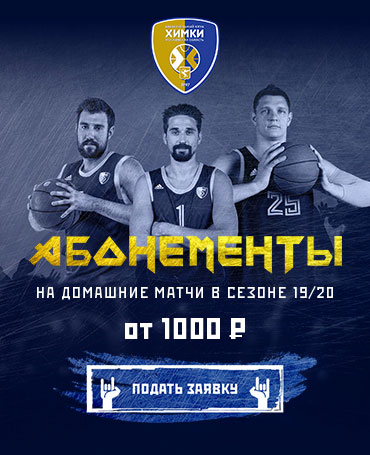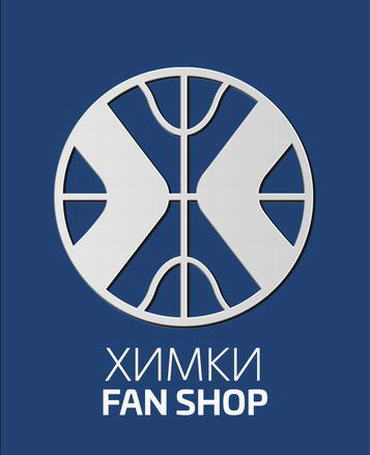2011-12 Qualifying Rounds Profile: BC Khimki Moscow Region 5 september 2011
Euroleague.net
After taking the same route to the continent’s top competition a year ago, BC Khimki Moscow Region enters the Turkish Airlines Euroleague Qualifying Rounds as a favorite to reach the regular season again. Even though it did not make the Top 16, as it had in its Euroleague debut in 2009-10, Khimki was impressive and fun to watch last season.
Four victories – with no defeat by more than 8 points – made for excitement despite the team coming a victory shy of survival. The memory of having come just short of bigger things last season will no doubt motivate Khimki to make another run through the qualifying rounds. The club is young, having been established in 1997 and reached the Russian League for the first time two years later. By the 2000-01 season, however, Khimki ranked seventh in the Russian League and made its Korac Cup debut. Khimki registered similar results the next season before leaping ahead in the 2002-03 season by reaching the Russian League semifinals, where perennial champion CSKA stood in the way, and advancing to the second stage in the FIBA Europe Champions Cup. Khimki challenged in every competition over the next couple of seasons, finishing fifth and fourth respectively in the Russian League and getting to the Russian Cup semifinals in 2004 and 2005. The team did even better in the FIBA Europe League, getting to the eighthfinals in 2004 and making it to the final four in 2005, where it lost to eventual champion Dynamo St. Petersburg. Khimki climbed one step higher in 2006 as it reached both the Russian League and the Russian Cup finals, losing once again against mighty CSKA. The club also reached the FIBA EuroCup final, but fell to DKV Joventut. In 2006, the club finished third in the Russian League and advanced to the ULEB Cup elimination rounds. That set the stage for dream campaign in 2007-08 that included winning its first title – the Russian Cup. The club not only beat Euroleague champion CSKA Moscow to win the cup, but also reached the Russian League finals and had a very strong showing in the ULEB Cup before bowing out to eventual champion DKV Joventut in the Last 16. With stars Jorge Garbajosa, Carlos Delfino and Kelly McCarty on board, Khimki soared to the 2009 Eurocup title game against Lietuvos Rytas. Despite leading by 12 points in the second half, Khimki lost a thriller and missed a chance for its first European trophy. Nonetheless, a runner-up finish in the Russian League got Khimki into the Euroleague where its debut season was outstanding, with third-place finishes in the regular season and Top 16. Only a tie-break kept Khimki from advancing to the playoffs. Last season Khimki used the qualifying rounds to crash the Euroleague again, but this time fell short of advancing out of the regular season. It also returned to the Russian League finals, but for the fourth year in a row lost against CSKA.
This season Khimki starts out by looking to build on its recent success and to even surpass it. The club comes into the Euroleague Qualifying Rounds with several core players back from last season, namely stars Keith Langford, Kresimir Loncar, Sergey Monya, Vitaly Fridzon and Zoran Planinic. At the same time, the roster has been significantly upgraded. Big man Timofey Mozgov is back on the team, versatile forward Matt Nielsen brings experience and rookie point guard Chris Quinn could be a difference-maker for head coach Rimas Kurtinaitis. The backcourt is simply loaded with impact players. Quinn and Planinic figure to be the lead playmakers, or they can play together, thanks to Planinic’s height. Langford is the go-to scorer, while shooter Thomas Kelati can single-handedly break defenses and Fridzon drive through them. The versatile Monya is a mismatch at either forward spot, and will likely play alongside Nielsen, who has unique passing skills for a power forward. Loncar, Mozgov and Alexey Zhukanenko form a mighty trio in the paint. Together this roster gives Khimki fans reasons to believe in a return to the Euroleague.
This season Khimki starts out by looking to build on its recent success and to even surpass it. The club comes into the Euroleague Qualifying Rounds with several core players back from last season, namely stars Keith Langford, Kresimir Loncar, Sergey Monya, Vitaly Fridzon and Zoran Planinic. At the same time, the roster has been significantly upgraded. Big man Timofey Mozgov is back on the team, versatile forward Matt Nielsen brings experience and rookie point guard Chris Quinn could be a difference-maker for head coach Rimas Kurtinaitis. The backcourt is simply loaded with impact players. Quinn and Planinic figure to be the lead playmakers, or they can play together, thanks to Planinic’s height. Langford is the go-to scorer, while shooter Thomas Kelati can single-handedly break defenses and Fridzon drive through them. The versatile Monya is a mismatch at either forward spot, and will likely play alongside Nielsen, who has unique passing skills for a power forward. Loncar, Mozgov and Alexey Zhukanenko form a mighty trio in the paint. Together this roster gives Khimki fans reasons to believe in a return to the Euroleague.
Source
http://www.euroleague.net/news/i/86298/180/item



